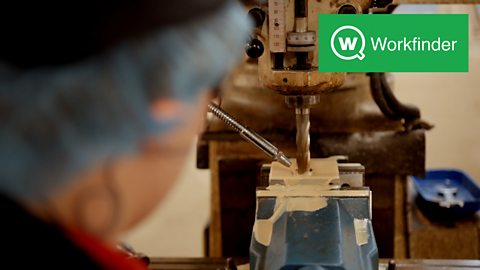Meet Callum, 21, to find out more about life as a machine operator. Part of our Bitesize world of work series.
I'm Callum, I'm 21, and I'm a machine operator. I'm a Level 3 production operator, and I work in a sawmill in County Durham which produces which produces wooden materials for things such as fences, pallets - anything you can think of really.
Basically, I run a machine called an optimiser which cuts wood down to specified sizes to cover the orders that we have. The optimiser takes the boards through one at a time, scans the boards and gets the best cut out of the board. Then the board goes on to an infeed chain which sends it through a saw box which has blades that move to get the correct size. I control the optimiser by sitting in a cabin on a chair which has a control I'm on. I feed the boards through the machine - you can do them automatically or manually - and that just puts the boards through the scanner and then through the saw box. I use a computer to change the run numbers and also to change the position of the blades to make sure we're getting the right cut. If something went wrong, I'd try and solve the problem myself to start off with but, if I was unsure, we've got trained engineers on hand to help us with any problems. It's important to get the optimiser running as quickly as possible as it can cause a line to stop if the wood starts to pile up.
At school I was always very interested in engineering so during my GCSEs I took Engineering, Further Maths, and Science. At college, I studied a Level 3 diploma in Engineering. Ultimately, I wanted to work with machines and that's why I like working here. It's very satisfying because it means all the time I spent at college learning things I can now actually use them in the workplace and it makes it all worthwhile actually going learning these things.
My favourite thing about this job is I'm always busy, I get to work with machines every day, and I also have a good relationship with the people who work here and it's just a friendly environment to work in. In the future I might look to go more engineering but, right now, this is perfect as me and my partner have just had our first baby and I work two opening shifts so it means each week one of us can have a bit extra sleep than the other. The hours I work here help me balance my work life and family life which is really important to me because it allows me to be the family man I would like to be.
Balancing work and family is important and this job enables me to be the family man I want to be.
- Callum's favourite subjects at GCSE were Maths, Electronics and Design Technology
- Knowledge in these areas allowed him to study Engineering at college
- What he likes best about his job is learning how things work, his friendly team, and his hours
- Callum works in shifts of either 6am-3pm or 3pm-midnight which means he's able to spend time at home with his young daughter.



Callum is a machine operator. A similar role to Callum's is a production worker, also known as a process operative or factory worker. They manufacture goods and parts for different industries.
What to expect if you want to be a production worker
- Production worker average salary: £17,000 to £24,000 per year
- Production worker typical working hours: 37 to 42 per week
What qualifications do you need to be a production worker?
You could get into this role via an apprenticeship, such as an intermediate apprenticeship in lean manufacturing, or by applying directly if you meet the job advert requirements. Experience of production line work would be useful for applications. For some roles, a forklift truck training certificate would also be helpful.
Sources: LMI for All, National Careers Service.
This information is a guide and is constantly changing. Please check the National Careers Service website for the latest information and all the qualifications needed.
For careers advice in all parts of the UK visit: National Careers Service (England), nidirect (Northern Ireland), My World of Work (Scotland) and Careers Wales (Wales).


Work experience in your area
Find work experience placements with Workfinder.
Tips and advice
Help with interviews, writing a CV and all things work experience related.


Khadija: first aider
Khadija uses her medical knowledge to teach young people first aid.

Shola: trainee karate instructor. video
Shola uses her knowledge of the body in her role as a trainee karate instructor.

Lucy: vet
Lucy uses her knowledge of Biology in her job as a vet.
